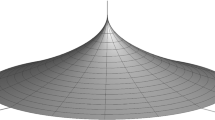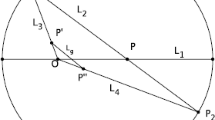Abstract
A group of curves generates a new curve which is called an envelope. When one deals with a minimization problem with infinitely many inequality constraints, one must encounter an envelopelike effect caused by the constraints. In this paper we present second-order necessary conditions, which involve a new term besides the second derivative of the Lagrange function.
We apply our results to minimizing problems of sup-type functions. One will observe in examples that the new term given in this paper explains well the behavior of the second directional derivative of the sup-type function.
Similar content being viewed by others
References
A. Ben-Tal, “Second-order theory of extremum problems,” in: A.V. Fiacco and K. Kortanek, eds.,Extremal Methods and System Analysis (Springer, Berlin, 1980) 336–356.
A. Ben-Tal, M. Teboulle and J. Zowe, “Second order necessary optimality conditions for semi-infinite programming problems,” in: Lecture notes in control and information science 15 (Springer, Berlin, 1978).
A. Ben-Tal and J. Zowe, “A unified theory of first and second order conditions for extremum problems in topological vector spaces,”Mathematical Programming Study 19(1982) 39–76.
N. Furukawa and Y. Yoshinaga, “Higher-order variational sets, variational derivatives and higherorder necessary conditions in abstract mathematical programming,” unpublished.
I.V. Girsanov,Lectures on Mathematical Theory of Extremum Problems, Lecture notes in economics and mathematical systems 67 (Springer, Berlin, 1972).
K.H. Hoffmann and H. J. Kornstaedt, “Higher-order necessary conditions in abstract mathematical programming,”Journal of Optimization Theory and Applications 26(1978) 533–569.
A.D. Ioffe, “Necessary and sufficient conditions for a local minimum. 3: Second order conditions and augmented duality,”SIAM Journal on Control and Optimization 17(1979) 266–288.
A.D. Ioffe and V.M. Tihomirov, “Duality of convex functions and extremum problems,”Russian Mathematical Survey 23(1968) 53–123.
H. Kawasaki, “Second order necessary optimality conditions for minimizing sup-type function,” submitted toMathematical Programming.
S. Kurcyusz, “On the existence and nonexistence of Lagrange multipliers in Banach spaces,”Journal of Optimization Theory and Applications 20(1976) 81–110.
H. Maurer, “First and second order sufficient optimality conditions in mathematical programming and optimal control,”Mathematical Programming Study 14(1981) 163–177.
H. Maurer and J. Zowe, “First and second-order necessary and sufficient optimality conditions for infinite-dimensional programming problems,”Mathematical Programming 16(1979) 98–110.
S.M. Robinson, “Stability theory for systems of inequalities, part II: Differentiable nonlinear systems,”SIAM Journal of Numerical Analysis 13(1976) 487–513.
R.T. Rockafellar,Convex Analysis (Princeton University Press, Princeton, NJ, 1970).
J. Zowe, “A remark on a regularity assumption for the mathematical programming problem in Banach spacees,”Journal of Optimization Theory and Applications 25(1978) 375–381.
Author information
Authors and Affiliations
Rights and permissions
About this article
Cite this article
Kawasaki, H. An envelope-like effect of infinitely many inequality constraints on second-order necessary conditions for minimization problems. Mathematical Programming 41, 73–96 (1988). https://doi.org/10.1007/BF01580754
Received:
Revised:
Issue Date:
DOI: https://doi.org/10.1007/BF01580754




